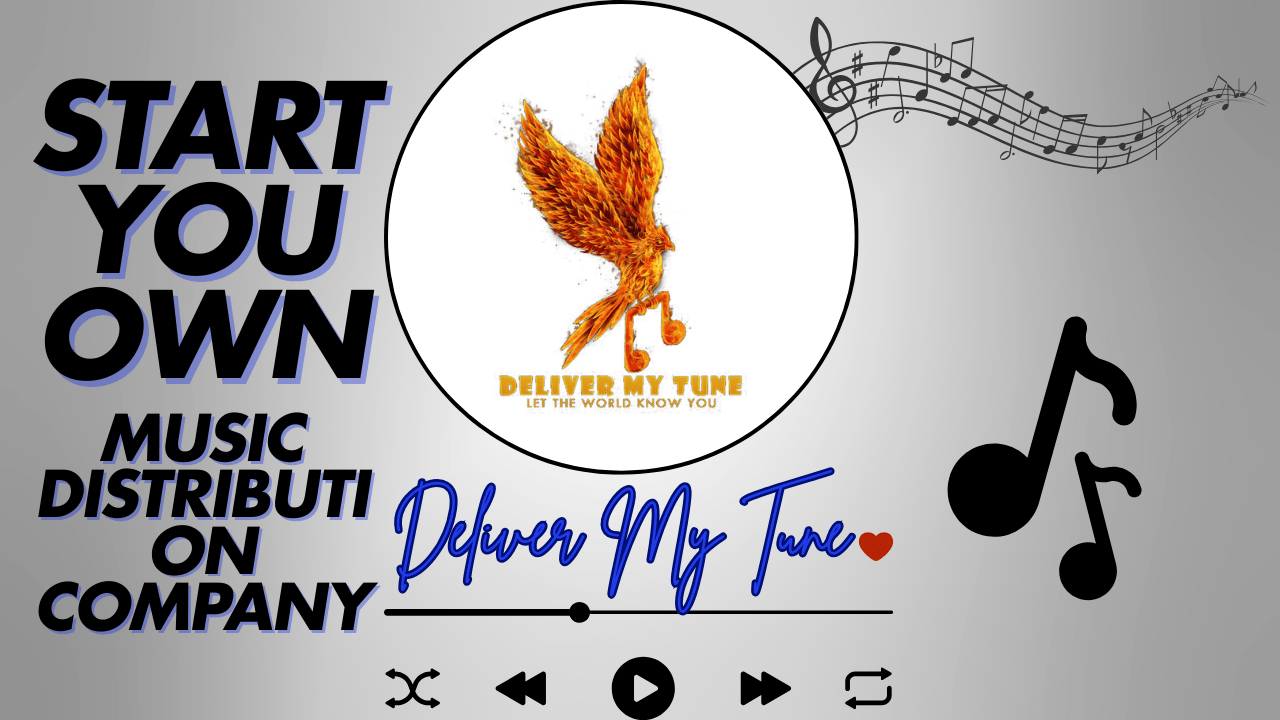In today’s digital landscape, the music industry has transformed significantly. Artists can release their music to a global audience without traditional record labels, thanks to music distribution companies. Starting your own music distribution company can be a fantastic opportunity, with digital distribution booming and independent artists seeking platforms to share their music. Here, we break down the steps, challenges, and tips for successfully starting your own music distribution company.
Understanding Music Distribution and Its Role
Music distribution is the link between artists and listeners. It involves distributing music from artists or labels to digital platforms where listeners can stream, download, or buy the music. Platforms like Spotify, Apple Music, and Amazon Music rely on distributors to upload songs and ensure they meet the platform’s requirements. As a music distribution company, you will facilitate this process, helping artists make their music available to global audiences while earning revenue through royalties.
Starting a music distribution company can empower independent musicians who need an accessible, reliable way to reach audiences. Additionally, the business offers a substantial revenue potential if managed efficiently.
Why Start Your Own Music Distribution Company?
There are several benefits to starting your own music distribution company in today’s market:
- Increase in Independent Musicians: Many artists are turning away from traditional labels, looking for independent distribution services.
- Growing Popularity of Streaming Platforms: Streaming services continue to grow, creating demand for effective distribution.
- Flexible Revenue Potential: A distributor earns by taking a percentage of royalties or charging a fee for each release, allowing for sustainable growth.
These factors make this a promising time to start a music distribution company, with many artists seeking distribution services to bring their music to listeners worldwide.
Step 1: Conduct In-Depth Industry Research
To start your own music distribution company successfully, begin with comprehensive industry research. Understanding how music distribution works will help you provide better services. Key areas to explore include:
- Distribution Models: Learn about traditional, digital, and hybrid distribution models.
- Competitors: Study companies like CD Baby, TuneCore, and DistroKid to understand their strengths and strategies.
- Regulations and Licensing: Each region has rules about royalties, licensing, and distribution. Get familiar with these to operate legally.
Proper research will set a solid foundation, helping you avoid pitfalls and set your business apart in the music distribution industry.
Step 2: Create a Business Plan
A well-thought-out business plan acts as a roadmap. Your plan should include the following elements to help you start your own music distribution company effectively:
- Mission Statement: Define what your company aims to achieve.
- Target Audience: Identify the artists you want to serve (independent artists, niche genres, etc.).
- Revenue Streams: Choose how you’ll earn, whether through royalty shares, subscriptions, or one-time fees.
- Marketing Strategy: Outline how you will reach and retain clients.
- Operations Strategy: Develop workflows, from onboarding artists to managing their releases.
Having a business plan ensures that you have a clear vision and operational structure for your company’s growth.
Step 3: Choose a Business Model
Music distribution companies commonly follow one of these revenue models:
- Royalty-Based Revenue: Charging a percentage of the artist’s earnings (typically 10-30%).
- Subscription Model: Offering artists a subscription for an annual or monthly fee.
- Per-Release Fee: Charging a fixed amount for each song or album distributed.
Select a model that matches your business goals and aligns with your artists’ needs. Consider offering various plans to appeal to both independent artists and labels.
Step 4: Set Up Your Business Structure and Legal Requirements
Legitimizing your company requires proper licensing, a registered business entity, and financial systems to manage artist payments. Here’s what to consider:
- Register Your Company: Register as an LLC, sole proprietorship, or corporation, depending on your business needs.
- Licenses and Compliance: Obtain any required permits to operate as a music distributor.
- Financial Accounts: Open business bank accounts and set up accounting systems for managing royalty payouts and service payments.
Operating legally and having a well-structured financial system will add credibility to your business and attract more artists.
Step 5: Forge Partnerships with DSPs
Securing partnerships with Digital Service Providers (DSPs) is vital. Platforms like Spotify and Apple Music require specific criteria to partner. Here’s how to establish these partnerships:
- Identify DSPs to Work With: List out platforms where you aim to distribute music.
- Comply with DSP Standards: Ensure your platform meets technical requirements, such as metadata accuracy and audio quality.
- Negotiate Terms: Work out revenue splits and responsibilities with each DSP.
Having strong DSP partnerships will help you provide a wide range of distribution options to your clients.
Step 6: Build Your Distribution Platform
Developing a user-friendly platform where artists can upload music, manage releases, and track analytics is crucial. Here are key platform features:
- Intuitive Dashboard: Make it easy for artists to upload tracks, add metadata, and select distribution platforms.
- Real-Time Analytics: Provide insights into streams, downloads, and royalty earnings.
- Secure Infrastructure: Invest in data protection and storage solutions to handle high volumes of audio files safely.
A well-designed platform will streamline distribution processes, making your company a preferred choice for artists.
Step 7: Set Up Royalty Tracking and Payment Systems
Managing royalties and ensuring timely payments is a core function of any music distribution company. To handle this efficiently:
- Automate Royalty Calculations: Use royalty management software to simplify payment calculations.
- Secure Payment Gateway: Choose a reliable gateway to process artist payments securely.
- Detailed Reporting: Provide artists with clear statements on their earnings and song performance.
Efficient royalty tracking not only enhances your company’s reputation but also builds trust with artists.
Step 8: Attract Artists with Marketing and Brand Awareness
Attracting artists to your platform is essential for growth. Here are some methods to reach out to potential clients:
- Content Marketing: Blog posts, guides, and videos can educate artists on the value of working with you.
- Social Media Campaigns: Engage with artists on platforms like Instagram, TikTok, and Twitter.
- Influencer Collaborations: Partnering with well-known musicians or influencers can boost credibility and increase visibility.
A strong marketing strategy will help you build your brand and attract independent artists looking for distribution services.
Step 9: Offer Additional Services for a Competitive Edge
Providing value-added services can make your distribution company stand out. Consider these options:
- AI Mastering: Help artists improve the audio quality of their tracks through AI mastering.
- Social Media Management: Assist artists with content creation and engagement on platforms like Instagram and YouTube.
- Portfolio Services: Create artist portfolios that showcase their music and help them connect with fans.
Offering a range of services will make your company more appealing to artists, setting you apart from competitors.
Step 10: Scale Your Music Distribution Business
Once your business is established and gaining traction, focus on scaling. Here are strategies to help grow your music distribution company:
- Expand Internationally: Partner with DSPs in other regions to reach global audiences.
- Hire Experts: Bring in specialists for marketing, customer service, and technical support to maintain quality.
- Invest in Technology: Regularly update your platform to meet artists’ needs and enhance user experience.
Scaling effectively ensures you can handle a growing client base without compromising service quality.
Common Challenges and How to Overcome Them
Starting a music distribution company has its unique challenges. Here’s how to tackle them:
- Navigating Legal and Copyright Issues: Work with legal experts to ensure compliance with copyright laws in different regions.
- Handling Artist Onboarding and Support: Create an easy onboarding process and offer timely support to address artist questions.
- Managing Royalties and Payments Efficiently: Automate royalty distribution to avoid delays and ensure accuracy.
Addressing these challenges head-on will create a smoother experience for artists, fostering loyalty and trust.
Essential Tools for Running Your Distribution Business
Here are some tools and software that can simplify processes and enhance efficiency:
- Royalty Software: Automates royalty calculations and ensures timely payouts.
- Content Management System (CMS): Aids in managing uploads, metadata, and release schedules.
- Analytics Platform: Provides real-time data on track performance across different DSPs.
Utilizing these tools allows you to focus on growth and better serve your artists.
Final Tips for Starting Your Own Music Distribution Company
Starting a music distribution company requires strategic planning, adaptability, and a strong commitment to supporting artists. Here are some final tips:
- Build Strong Relationships: Networking with DSPs, artists, and industry professionals is crucial.
- Stay Updated on Trends: The music industry evolves quickly, so stay informed about new trends, DSP updates, and artist needs.
- Focus on Customer Service: Providing excellent support builds loyalty and positive word-of-mouth.
By focusing on these areas, you’ll be well-prepared to start your own music distribution company that serves artists worldwide and continues to grow.
Conclusion
When artists know they can trust you with their music, you’ll earn loyalty and referrals, building a brand that resonates in the music community. Here’s a quick recap to help you remember the most critical aspects of starting a music distribution company:
- In-Depth Research and Planning: Understand the industry inside out, create a solid business plan, and identify your target audience.
- Choose the Right Business Model: Whether you opt for a royalty-based, subscription, or per-release model, align it with your goals and artist needs.
- Secure DSP Partnerships: These relationships allow you to offer comprehensive distribution to artists and provide value.
- Develop a Robust Platform: Invest in a user-friendly platform with secure infrastructure and clear analytics for artists.
- Efficient Royalty Management: Set up automated systems to calculate and pay royalties accurately.
- Attract and Retain Artists: Market your platform effectively and provide exceptional service to build a loyal client base.
- Differentiate with Extra Services: Offering additional services like AI mastering, social media management, and artist portfolios can help you stand out.
- Plan for Growth: Once established, expand your reach globally and invest in technology and expert staff to support a larger client base.
Starting a music distribution company may seem complex, but with the right approach, tools, and dedication, it’s entirely achievable. As you grow, keep your mission clear: to empower artists by making their music accessible to audiences everywhere.
With patience, adaptability, and focus, you can build a successful business that not only generates revenue but also contributes to the ever-growing music industry by helping artists achieve their dreams.
Related Articles:
For further reading, explore these related articles:
- Mastering the Art of Spotify Music Distribution
- Comprehensive Guide to Music Marketing Distribution: Strategies for Success
- The Largest Music Distribution Companies: A Complete Guide for Artists
For additional resources on music marketing and distribution, visit Deliver My Tune.






